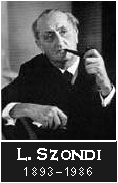













Merry Christmas and a Happy New Year
Joyeux Noël et Bon Nouvelle Année
Felices Navidades y Próspero Ano Nuevo
Que tengas un buen Natal y un año lleno de realizaciones
S Novym Godom i S Rozhdestvom Hristovym
 |
||
 |
 |
|
Michel Foucault (1926-1984)One of the most important modern philosophers, Foucault investigated the history of how we live and think, revealing hidden assumptions , alternatives, and underlying relationships of power. The Birth of the Clinic (1963):Foucault received higher degrees in both philosophy and psycho-pathology. In Madness and Civilization and The Birth of the Clinic, he offers one of the major criticisms of modern psychiatry. In many ancient societies, the mad lead a life of troubled wandering. Some like Van Gough or Nietzsche made fascinating contributions to the world. But in the 19th century, he contends, "mental illness" was invented and a "scientific" discourse evolved around it. Consequently, the mad were confined and tormented by the moralizing psychiatrist. Discipline and Punish (1975):In the last few hundred years, the treatment of the criminal changed from the "spectacle of the scaffold" to the modern system of confinement and reform. As with the treatment of mental illness, Foucault situates the evolution of criminology in the modern society -- a society in which the individual is increasingly judged, shepherded and observed by authorities. An important concept is the Panopticon, a system (be it prison building or computer network) in which people are constantly immersed in a hierarchy of surveillance. The History of Sexuality (1976, 1984):"At the beginning of the seventeenth century, a certain frankness was still common, it would seem. Sexual practices had little need of secrecy; words were said without undue reticence, and things were done without too much concealment…anatomies were shown and intermingled at will, and knowing children hung about amid the laughter of adults…" The conventional wisdom has been that the 19th century was the beginning of a modern age of sexual repression and secrecy. Foucault argues that the opposite is true -- never before has sexuality been more discussed and "scientifically" classified. Foucault criticizes this trend toward "medicalization" of human behavior and the "medical power" of experts. In particular he discusses:
|
 |
 |
c 1996-2000 Leo Berlips, JP Berlips & Jens Berlips, Slavick Shibayev